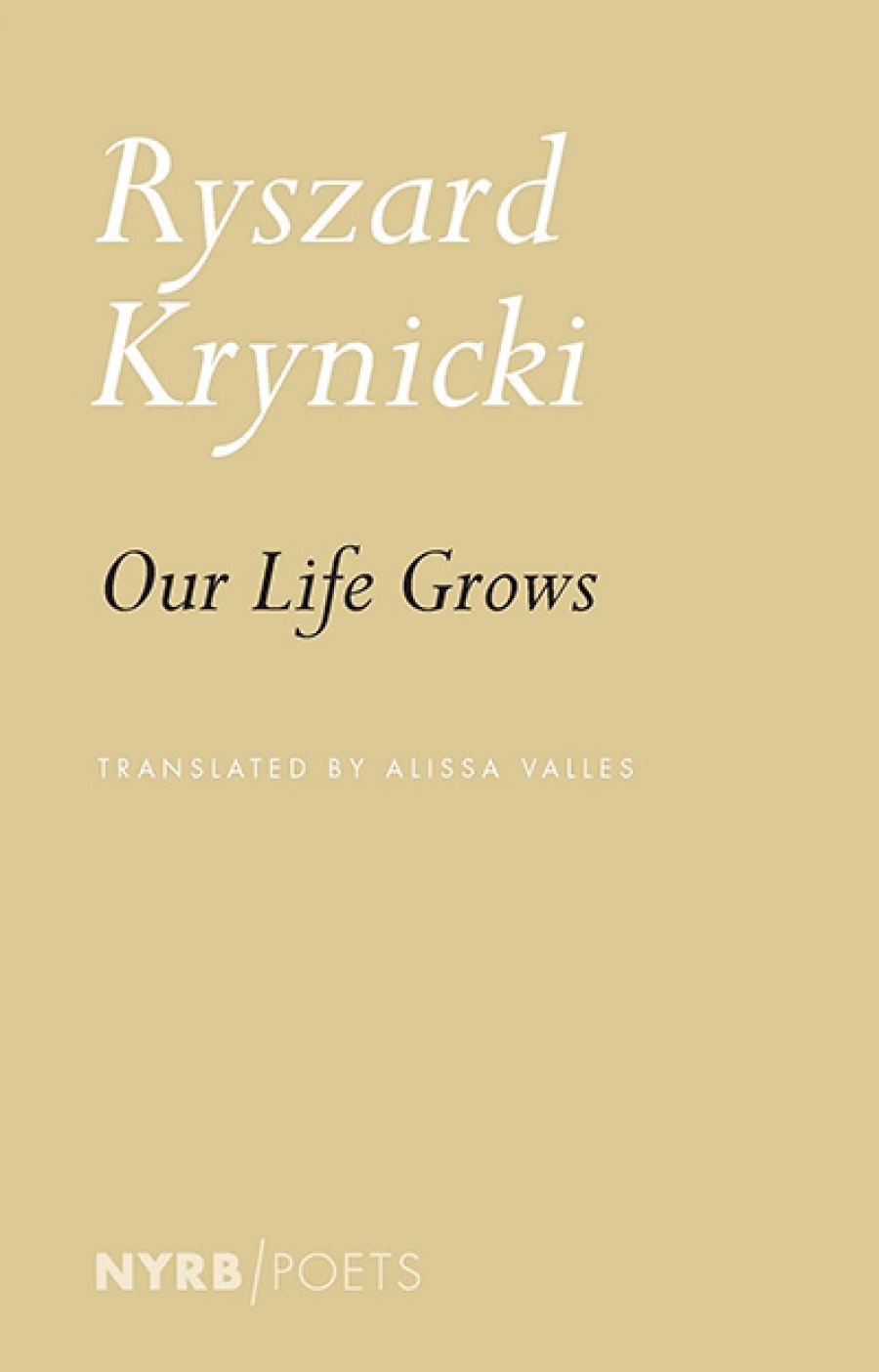
- Free Article: No
- Contents Category: Poetry
- Custom Article Title: Benjamin Ivry reviews 'Our Life Grows' by Ryszard Krynicki, translated by Alissa Valles
- Review Article: Yes
- Online Only: No
- Custom Highlight Text:
This poem, cited in its entirety, is ‘My Poor Son’ by the Polish writer Ryszard Krynicki, who will be seventy-five years old in June 2018. Likely the finest poet in the generation after Zbigniew Herbert, the dazzling philosopher of modern Polish verse who died twenty years ago, Krynicki was born in a Nazi slave labor camp ...
- Book 1 Title: Our Life Grows
- Book 1 Biblio: NYRB Poets, $22.99 pb, 120 pp, 9781681371603
As with most Poles, Krynicki’s ‘esoteric delicacy’ confronted postwar hardships, starting with repressive Soviet rule. Unlike some of his fellow intelligentsia, he neither fled the country nor retreated into passivity. In the 1970s and 1980s, he boldly signed petitions and circulated samizdat copies of his work. While some compatriots carried on their literary careers overseas, in 1980 he participated in a hunger strike in the church of St Krzysztof in provincial Poland, in sympathy with incarcerated pro-democracy activists.
Only recently has Krynicki’s work become abundantly available in English. This new translation of a 1978 collection follows his Magnetic Point: Selected poems (New Directions, 2017), translated by Clare Cavanagh. Yet for all his reticence, Krynicki’s work has been known to those attentive to developments in Polish poetry. I recall seeing the translation into German of Krynicki’s poems in 1991 by Karl Dedecius (1921–2016), a star-making translator of Polish poets in Germany, giving them pan-European prominence. Among Dedecius’s previous finds were Herbert and the Nobel Prize-winning eminence Czesław Miłosz. Dedecius’s imprimatur on Krynicki’s poems, collected as Wunde der Wahrheit (Wound of Truth) was validated by their startling aura of purity and concentrated emotion. I reviewed Krynicki’s book in an English-language venue, including some of my own translations of the poems. I then asked a translator with whom I had been collaborating on projects from Polish into English if she would consider trying a volume of Krynicki’s work. She refused on the grounds that she had vowed never again to translate the work of a living poet. Given an international profile, she argued, poets gain hubris and other unattractive traits, citing one author so ambitious for accolades that a few of his fellow Poles had nicknamed him ‘Nobelski’. I argued that Krynicki, from what I had read about his modest, self-doubting personality, showed no signs of developing into a monstrous ego. ‘They all change,’ she replied darkly.
That decisive response put paid to my plan to translate Krynicki. Alissa Valles, who has published poetry under the name Alissa Leigh, has deftly retained a lyrical turn of phrase even in his sparsest lines. Previously, in Krynicki’s Selected Poems, Cavanagh, despite admirable diligence and conviction, sometimes dipped into prosiness. By contrast, Our Life Grows has many endearing poems with an air of wonderment, such as ‘My Daughter Learns to Read’: ‘My little daughter, faultless until now, / is learning to read and write / and only now does she begin to err // and I live my old errors of humanity / all over again.’
It is fitting that Krynicki should finally attract the attention of translators, since he has labored mightily himself to translate such German-language poets as Paul Celan and Nelly Sachs into Polish. Influenced in his own work by writers as varied as Osip Mandelstam, Joseph Brodsky, the Japanese haiku master Issa, and the Polish modernist Alexander Wat, Krynicki has also run a small literary publisher, a5 Press, for more than two decades. And pace my former collaborator, despite added renown, he has to all evidence retained an admirable diffidence. In a still-untranslated book of interviews published in 2014 by Biuro Literackie (Literary Office), he noted:
I think that it is worth learning silence in art, so I try to learn it in poetry. I think that focused poems are better able to listen to other people … When I do not publish, it does not mean that I stop doing poetry at the time. I deal with it then maybe even more intensively, if only because I translate other people’s poems and publish other people’s books … I really write enough, also because I prefer to put poems in my head and keep them in my memory. I write them only at the end, when it seems to me that I’m ready, or when I’m afraid that I could forget them. Of course, some I forget, but maybe they were not worth remembering? [reviewer’s translation]
Krynicki added: ‘Poems should be written when you have something to say. When you experience a revelation. When a spiritual discovery takes place, or at least you have the impression that it was accomplished … It depends on character. A sense of taste. Sensitivity.’
Remarkably, Ryszard Krynicki’s poems meet his own stringent criteria.


Comments powered by CComment